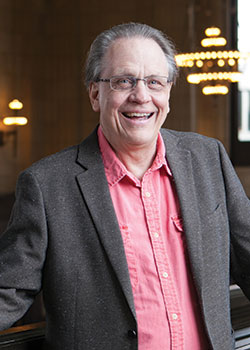Bladder Cancer Survivor
Learning to Enjoy Life
 Bladder cancer survivor, father, CPA and Vietnam veteran Mike Urbom is a retiree who stays active, traveling, skiing and hiking. He appreciates the small things now more than ever, after his cancer journey taught him how important it is to make time for what you really enjoy in life.
Bladder cancer survivor, father, CPA and Vietnam veteran Mike Urbom is a retiree who stays active, traveling, skiing and hiking. He appreciates the small things now more than ever, after his cancer journey taught him how important it is to make time for what you really enjoy in life.
I knew it wasn’t normal when I saw blood in my urine. I went to see my doctor, who put a scope into my bladder. It was pretty easy to diagnose after that.
I had an idea of what it was before I was given my official diagnosis. I’d been doing some research on the symptoms and happened across a cancer forum where a woman told me I had exactly the same symptoms as her mother. I was 55 and had high-grade, superficial transitional cell carcinoma (TCC) of the bladder. A CT scan immediately following the scope confirmed I also had tumors in my right kidney and right ureter.
I didn’t get a second opinion right away. My urologist was very informative, and I could understand what he was telling me. The cancer in the bladder wasn’t invasive; it hadn’t gone into the muscle. He suggested a transurethral resection of the bladder (TURB) to scrape the superficial tumors off the bladder wall. I was in the hospital for three days. This surgery was followed by an instillation of chemotherapy injected directly into my bladder.
I then had a second surgery to remove the kidney and ureter and was in the hospital for four days. I tried to tell people not to visit until I got home because I knew how I’d feel, but they came anyway—and I appreciated the support. After the surgeries, I received a type of immunotherapy. It was injected directly into my bladder, just like the chemo. It seemed like I had a lot of treatments over the years, but my doctor followed all of the protocol for that treatment regimen. The maintenance therapy finally ended a couple of years ago.
For quite some time, I didn’t have a lot of strength and felt pretty uncomfortable. Physically, you’re not going to be up to your old self for a while. And getting poisons pumped into your bladder burns a bit; it might throw some people for a loop. I haven’t had any noticeable, lasting effects, though. I do get the occasional muscle cramp in my side where the incision was, but beyond that I feel fine. As for follow-up care, because my doctor told me my remaining kidney functions at around 50 percent, I underwent an annual kidney and bladder scope for several years to be sure there was no recurrence. Unfortunately, I couldn’t have PET scans because the contrast medium could damage my remaining kidney. It’s still functioning, and I plan to keep it that way.
I’ve stuck with my doctor all these years because he was always very open to talking about other options. He actually helped me coordinate a visit with another doctor after surgery for another opinion. That doc told me, “The bladder will come out.” At first it made me question the procedures I’d already had done. But I haven’t had the need to remove my bladder yet, and it’s been 10 years. I’m always aware the cancer could return, but I enjoy every day as much as I can and try not to worry. For a while it might be like a record playing over and over in your head, but eventually it’ll subside. If it doesn’t, I definitely recommend talking to someone.
When I had symptoms – and after the official diagnosis – I did a lot of self-educating. One of the most helpful sites I found was www.acor.org (Association of Cancer Online Resources). They connected me with forums and research I found extremely helpful. I firmly believe that you’re in charge of your own education. You have to ask the questions, look for the answers and do your research. If you find yourself overwhelmed by all of the information available, shut it down for a while. You may have to take a step back and sift out what it is that you want to know because there are many different layers of information.
When you visit the doctor, take notes. I recommend bringing someone along to do the note taking—preferably someone who will also pursue the questions because you’ll be a little bit dazed. Also, find other survivors! They can tell you firsthand what they’ve been through and how they coped with it. Finally, leave room in your life for the small things. For me, those are the ski trips I try to take every year now, and being able to volunteer at the Komen 3-Day walk in the Twin Cities each summer. They often matter the most but are the easiest to overlook when you’re in the middle of a busy work schedule or raising a family.


